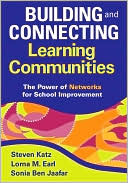List Books » Building and Connecting Learning Communities: The Power of Networks for School Improvement
Category Books
- Fiction Books & Literature
- Graphic Novels
- Horror
- Mystery & Crime
- Poetry
- Romance Books
- Science Fiction & Fantasy
- Thrillers
- Westerns
- Ages 0-2
- Ages 3-5
- Ages 6-8
- Ages 9-12
- Teens
- Children's Books
- African Americans
- Antiques & Collectibles
- Art, Architecture & Photography
- Bibles & Bible Studies
- Biography
- Business Books
- Christianity
- Computer Books & Technology Books
- Cookbooks, Food & Wine
- Crafts & Hobbies Books
- Education & Teaching
- Engineering
- Entertainment
- Foreign Languages
- Game Books
- Gay & Lesbian
- Health Books, Diet & Fitness Books
- History
- Home & Garden
- Humor Books
- Judaism & Judaica
- Law
- Medical Books
- New Age & Spirituality
- Nonfiction
- Parenting & Family
- Pets
- Philosophy
- Political Books & Current Events Books
- Psychology & Psychotherapy
- Reference
- Religion Books
- Science & Nature
- Self Improvement
- Sex & Relationships
- Social Sciences
- Sports & Adventure
- Study Guides & Test Prep
- Travel
- True Crime
- Weddings
- Women's Studies
Building and Connecting Learning Communities: The Power of Networks for School Improvement »

Authors: Sonia Ben Jaafar (Editor), Lorna M. Earl (Editor), Steven Katz
ISBN-13: 9781412966016, ISBN-10: 1412966019
Format: Paperback
Publisher: SAGE Publications
Date Published: September 2009
Edition: (Non-applicable)
Author Biography: Sonia Ben Jaafar
Sonia Ben Jaafar is a research associate at Aporia Consulting Ltd. She works internationally to support policy and program development and implementation through applied research and evaluation. Her areas of expertise include assessment, accountability, educational reform, policy and program development, and comparative studies.
Ben Jaafar graduated from the Ontario Institute for Studies in Education of the University of Toronto with a PhD in theory and policy studies. She also holds an MA in curriculum, teaching, and learning; a BEd specialized in science education; and a BSc in biochemistry.
Lorna M. Earl is a director of Aporia Consulting Ltd. and a retired associate professor from the Department of Theory and Policy Studies at the Ontario Institute for Studies in Education of the University of Toronto. She was the first director of assessment for the Ontario Education Quality and Accountability Office, and she as been a researcher and research director in school districts for over 20 years.
Throughout her career, Earl has concentrated her efforts on policy and program evaluations as a vehicle to enhance learning for pupils and for organizations. She has done extensive work in the areas of literacy and the middle years, but has concentrated her efforts on issues related to evaluation of large-scale reform and assessment (large-scale and classroom) in many venues around the world. She has worked extensively in schools and school boards, and has been involved in consultation, research, and staff development with teachers' organizations, ministries of education, school districts, and charitable foundations. Earl holds a doctorate in epidemiology and biostatistics, as well as degrees in education and psychology.
Steven Katz is a director with the research and evaluation firm Aporia Consulting Ltd. and a permanent faculty member in Human Development and Applied Psychology at the Ontario Institute for Studies in Education (OISE) of the University of Toronto. He is an associate member of the School of Graduate Studies and is the coordinator of the Psychology of Learning and Development initial teacher education program component.
Katz has a doctorate in human development and applied psychology, with a specialization in applied cognitive science. His areas of expertise include cognition and learning, teacher education, networked learning communities, and the design of data-driven systems for organizational accountability, planning, and improvement. He has received the Governor General's medal for excellence in his field, and has been involved in research and evaluation, professional development, and consulting with a host of educational organizations around the world.
Book Synopsis
Illustrating how networked learning communities (NLCs) can impact school improvement, the authors examine formal/informal leadership roles, collaborative inquiry as an essential tool, and how NLCs support schoolwide accountability.
Table of Contents
Preface Acknowledgments About the Authors
1. Why Networks? Why Now?
It’s About Learning Networks: A Powerful Organizational Tool Time for Reflection
2. How Networked Learning Communities Work What Are Networked Learning Communities?
How NLCs Work: The Theory of Action Using NLCs to Focus Local PLCs The Anatomy of a NLC: A Refined Theory of Action Time for Reflection
3. Establishing a Clear and Defensible Focus Focus Foremost Evidence-Based Focus From a School Focus to a Network Focus Time for Reflection
4. Collaborative Inquiry to Challenge Thinking and Practice The Importance of Relationships From Inquiry to an Inquiry Habit of Mind From Relationships to Deep Collaboration Getting to Powerful Collaborative Inquiry Time for Reflection
5. Leadership in Networked Professional Learning Communities Roles of Formal Leaders Roles of Informal Leaders Time for Reflection
6. From Student Learning to Teacher Learning Towards Focused Collaborative Inquiry Collaborative Inquiry for Teacher Leaders Within-School Focused Professional Learning: Collaborative Inquiry for Teachers Time for Reflection
7. Using the Network to Support Professional Learning for Leaders Collaborative Inquiry and Focused Learning for Leaders Using Critical Friends to Promote Inquiry and Focus Efforts From Collaborative Inquiry to Instructional Leadership Actions Time for Reflection
8. Sustaining Networked Learning Communities Sustaining Collective Understanding Sustaining Professional Learning Sustaining and Broadening Leadership Sustaining Powerful Networked Learning Communities Time for Reflection References Index
Subjects
 Academic Administration
Academic Administration  Educational Leadership
Educational LeadershipEducation & Teaching
 Academic Administration
Academic Administration  School Management & Organization
School Management & OrganizationEducation & Teaching
 Educational Theory, Research & History
Educational Theory, Research & History  Educational Reform
Educational ReformNonfiction
 All Nonfiction
All Nonfiction  Academic Administration
Academic Administration
